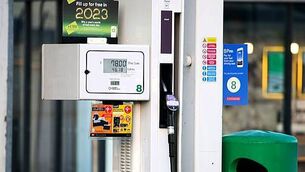Northern Ireland urged to trial shared e-scooter scheme

By Rebecca Black, PA
Northern Ireland has been urged to trial a shared e-scooter scheme to avoid falling behind on sustainable transport.
The call comes as a new Transport Strategy to 2035 for the region is being prepared by the Department for Infrastructure.
Collaborative Mobility UK (CoMoUK), the national charity for shared transport, has warned that Northern Ireland is at risk of falling behind the rest of the UK in terms of embracing new forms of sustainable transport.
It said urgent action was needed to unlock the potential of shared schemes such as e-scooters, bikes and e-bikes, which reduce people’s car dependency and cut emissions.
Trials of shared e-scooters have been running in England since 2020, with Scotland and Wales both working towards launching their own pilot schemes.
The charity says the latest figures show that shared e-scooters are becoming increasingly popular, with more than 60 million trips taken through the shared schemes in England by March this year.
It is currently illegal to ride privately-owned e-scooters on public roads in the UK, meaning that people are currently only able to access them through shared schemes.
In its submission to the Transport Strategy consultation, CoMoUK said these schemes and other forms of shared micromobility, such as e-bikes, can play a vital role in complementing public transport and active travel.
It said such initiatives also provide low-cost, low-emission alternatives to private car use, helping to reduce traffic congestion and support net-zero targets in the process.
It has urged the Department for Infrastructure to take action to support the provision of shared micromobility, including the expansion of the bike share scheme in Belfast.
It also suggested that Stormont should take steps to make it easier for communities to establish their own bike share schemes, and for a clear approach to the regulation of micromobility schemes, allowing them to operate safely and effectively in partnership with local authorities.
Richard Dilks, chief executive of CoMoUK, said action is needed.
“Northern Ireland has a real opportunity to embrace the benefits of shared transport, but it needs to act quickly to avoid lagging further behind other parts of the UK,” he said.
“Schemes such as shared e-scooters and e-bikes are increasingly popular and have been transformative elsewhere, helping to cut emissions, reduce traffic congestion, and giving people more sustainable ways to travel.
“By launching trials of shared e-scooters and encouraging the expansion of bike share schemes, Northern Ireland can make sure it is part of this exciting transition, rather than watching on from the sidelines.
“We stand ready to support the Department for Infrastructure and local authorities in developing and evaluating shared micromobility schemes, drawing on our extensive experience across the UK.”
In its response to the consultation, CoMoUK also highlighted the role of mobility hubs in promoting sustainable travel.
These hubs bring together a range of transport options and community facilities in a single, place, to make it easier for people to travel without using private cars.
CoMoUK said a network of these hubs in Northern Ireland could “reclaim space for sustainable and equitable modes (of transport), thereby reducing the dominance of the private car and its associated problems of congestion, carbon emissions, air quality and social exclusion”.
The charity said it has also created a set of standards for assessing the quality of mobility hubs, ensuring that they are safe, accessible, and offer a choice of transport modes.




